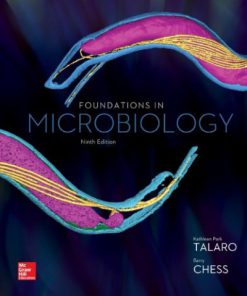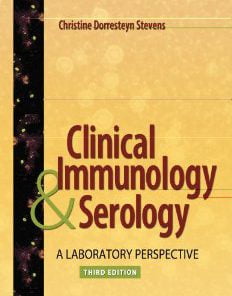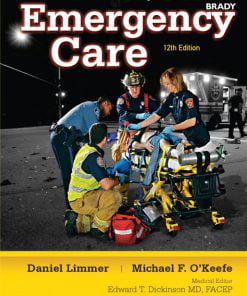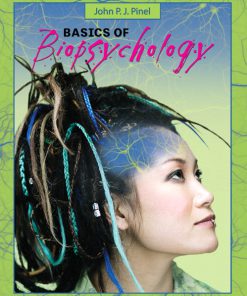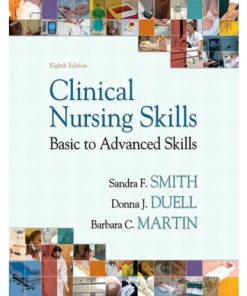Pharmacology Connections to Nursing Practice 3rd Edition Adams Test Bank
$35.00 Original price was: $35.00.$26.50Current price is: $26.50.
Pharmacology Connections to Nursing Practice 3rd Edition Adams Test Bank
Instant download Pharmacology Connections to Nursing Practice 3rd Edition Adams Test Bank pdf docx epub after payment.
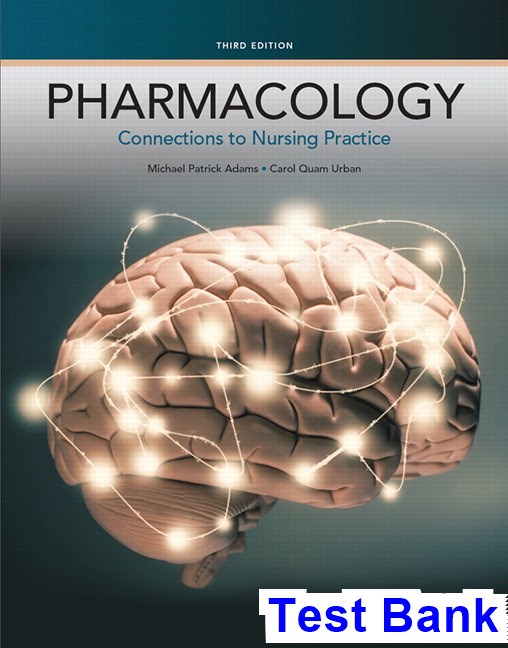
Product details:
- ISBN-10 : 0133923614
- ISBN-13 : 978-0133923612
- Author: Michael Patrick Adams; Carol Quam Urban
Pharmacology: Connections to Nursing Practice tightly links pharmacology to nursing practice and patient care, recognizing that for nurses, pharmacology is not an abstract academic discipline but rather a critical tool to prevent disease and promote healing and wellness. It offers unsurpassed features designed to illuminate connections between pharmacology and practice, from patient scenarios and practice applications to coverage of lifespan considerations, patient education, alternative therapies, and gender/cultural influences. Learning is simplified through the use of prototype drugs, as well as outstanding full-color illustrations. Organization by body systems (units) and diseases (chapters) places the drugs in context with how they are used therapeutically and connects pharmacology and pathophysiology to nursing care. The Third Edition covers 25 new medications approved by the FDA since the previous edition, a new chapter on Individual Variations in Drug Responses, and updated review questions that better prepare students for exams.
Table of contents:
Unit 1: Fundamental Principles of Pharmacology
1. Introduction to Pharmacology: Concepts and Connections
2. Drug Regulations
3. Pharmacokinetics
4. Pharmacodynamics
5. Adverse Drug Effects and Drug Interactions
6. Medication Errors and Risk Reduction
7. The Role of Complementary and Alternative Therapies in Pharmacotherapy
Unit 2: Pharmacology and the Nurse-Patient Relationship
8. Pharmacotherapy During Pregnancy and Lactation
9. Pharmacotherapy of the Pediatric Patient
10. Pharmacotherapy of the Geriatric Patient
11. Individual Variations in Drug Responses
Unit 3: Pharmacology of the Autonomic Nervous System
12. Review of Neurotransmitters and the Autonomic Nervous System
13. Cholinergic Agonists
14. Cholinergic Antagonists
15. Adrenergic Agonists
16. Adrenergic Antagonists
Unit 4: Pharmacology of the Central Nervous System
17. Review of the Central Nervous System
18. Pharmacotherapy of Anxiety and Sleep Disorders
19. Pharmacotherapy of Mood Disorders
20. Pharmacotherapy of Psychoses
21. Pharmacotherapy of Degenerative Diseases of the Central Nervous System
22. Pharmacotherapy of Seizures
23. Pharmacotherapy of Muscle Spasms and Spasticity
24. Central Nervous System Stimulants and Drugs for Attention Deficit/
25. Pharmacotherapy of Severe Pain and Migraines
26. Anesthetics and Anesthesia Adjuncts
27. Pharmacology of Substance Abuse
Unit 5: Pharmacology of the Cardiovascular System
28. Review of the Cardiovascular System
29. Pharmacotherapy of Hyperlipidemia
30. Pharmacology with Calcium Channel Blockers
31. Drugs Affecting the Renin-Angiotensin-Aldosterone System
32. Diuretic Therapy and the Pharmacotherapy of Renal Failure
33. Pharmacotherapy of Fluid Imbalance, Electrolyte, and Acid-Base Disorders
34. Pharmacotherapy of Hypertension
35. Pharmacotherapy of Angina Pectoris and Myocardial Infarction
36. Pharmacotherapy of Heart Failure
37. Pharmacotherapy of Dysrhythmias
38. Pharmacotherapy of Coagulation Disorders
39. Pharmacotherapy of Hematopoietic Disorders
Unit 6: Pharmacology of Body Defenses
40. Review of Body Defenses and the Immune System
41. Pharmacotherapy of Inflammation and Fever Hyperactivity Disorder
42. Immunostimulants and Immunosuppressants
43. Immunizing Agents
Unit 7: Pharmacology of the Respiratory System and Allergy
44. Pharmacotherapy of Asthma and Other Pulmonary Disorders
45. Pharmacotherapy of Allergic Rhinitis and the Common Cold
Unit 8: Pharmacology of Infectious and Neoplastic Disease
46. Basic Principles of Anti-Infective Pharmacotherapy
47. Antibiotics Affecting the Bacterial Cell Wall
48. Antibiotics Affecting Bacterial Protein Synthesis
49. Fluoroquinolones and Miscellaneous Antibacterials
50. Sulfonamides and the Pharmacotherapy of Urinary Tract Infections
51. Pharmacotherapy of Mycobacterial Infections
52. Pharmacotherapy of Fungal Infections
53. Pharmacotherapy of Protozoan and Helminthic Infections
54. Pharmacotherapy of Non-HIV Viral Infections
55. Pharmacotherapy of HIV-AIDS
56. Basic Principles of Antineoplastic Therapy
57. Pharmacotherapy of Neoplasia
Unit 9: Pharmacology of the Gastrointestinal System
58. Review of the Gastrointestinal System
59. Pharmacotherapy of Peptic Ulcer Disease
60. Pharmacotherapy of Bowel Disorders and Other Gastrointestinal Conditions
61. Vitamins and Minerals
62. Enteral and Parenteral Nutrition
63. Weight Reduction Strategies and the Pharmacotherapy of Obesity
Unit 10: Pharmacology of the Endocrine System
64. Review of the Endocrine System
65. Hypothalamic and Pituitary Drugs
66. Pharmacotherapy of Diabetes Mellitus
67. Pharmacotherapy of Thyroid Disorders
68. Corticosteroids and Drugs Affecting the Adrenal Cortex
69. Estrogens, Progestins, and Drugs Modifying Uterine Function
71. Drugs for Modifying Conception
70. Drugs for Disorders and Conditions of the Male Reproductive System
Unit 11: Additional Drug Classes
72. Pharmacotherapy of Bone and Joint Disorders
73. Pharmacotherapy of Dermatologic Disorders
74. Pharmacotherapy of Eye and Ear Disorders
75. Emergency Preparedness: Bioterrorism and Management of Poisoning
Appendices
A. Answers to Review
B. ISMP’s List of High Alert Medications
Glossary
Credits
People also search:
Pharmacology Connections to Nursing Practice 3rd Edition
Pharmacology Connections to Nursing Practice 3rd Edition pdf
Pharmacology Connections to Nursing Practice
what are the importance of pharmacology to nursing
what do you learn in nursing pharmacology
|
is pharmacology the hardest nursing class
|
Related products
Test Bank
Test Bank for Clinical Immunology and Serology A Laboratory Perspective, 3rd Edition: Stevens




